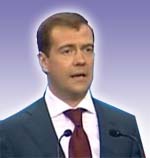Russia, US review issues, praise ties
 Moscow - Russian President Dmitri Medvedev met US Secretary of State Hillary Rodham Clinton on Tuesday evening, with both praising the improved state of US-Russian ties in dealing with international issues.
Moscow - Russian President Dmitri Medvedev met US Secretary of State Hillary Rodham Clinton on Tuesday evening, with both praising the improved state of US-Russian ties in dealing with international issues.
Medvedev described bilateral relations as being "forthright and on a high level" with both sides working intensively and faithfully "even on such complicated questions as Iran and North Korea."
The Kremlin leader also praised Clinton's efforts - and those of Russian Foreign Minister Sergei Lavrov - in Zurich over the weekend in helping to nail down the protocol agreements between the leaders of Turkey and Armenia.
This had been "a good example of cooperation in difficult international issues," Medvedev said.
Clinton, who had met Lavrov earlier on in Moscow, said bilateral ties were "remarkable" and that Washington aimed to "expand and deepen strategic relations with Russia."
The mutual remarks were the latest visible sign of the improved atmosphere between Washington and Moscow which has come about under the new administration of President Barack Obama.
In particular, Washington's recent decision to abandon the missile shield plans of the previous Bush administration in Poland and the Czech Republic - which Moscow had bitterly opposed - has given a boost to relations.
Commenting on the new atmosphere, Konstantin Kossatchov, head of the Russian parliament's foreign affairs committee, pointed to a meeting of Clinton's with Russia civil society groups.
"For the first time in may years has such a meeting taken place without superfluous emotions and with respect shown toward the sovereign development of a society," Kossatchov said.
He conceded there remained differences regarding the definition of civil rights, but these could be discussed in an atmosphere of trust and understanding.
Earlier, Clinton and Lavrov agreed in talks that a diplomatic route should be pursued in dealing with Iran's nuclear programme.
Stating in a press conference that it was not yet time for sanctions against Iran, Clinton however did not exclude the possibility of sanctions in principle, adding that Iran's nuclear programme was a serious problem.
She confirmed that Iran did have a right to use nuclear energy for civilian purposes, but that the international community had to be completely convinced of the peaceful intentions of the programme.
Lavrov said Moscow was very critical of the Iranian nuclear programme, but added that extreme pressure on Tehran would currently be "counterproductive."
Last month, Tehran revealed the existence of a second nuclear plant as part of its nuclear programme, which it insists is for peaceful purposes.
Lavrov said the US and Russia had made "considerable" progress in negotiations over their own nuclear weapons.
Many open questions had been clarified, the foreign minister said, adding that the first concrete draft had been assembled for a follow- up treaty to replace the US-Russian Strategic Arms Reduction Treaty (START) that expires in December.
The plan would call for the number of nuclear warheads to be reduced to 1,675 on each side, with the number of launch systems to fall to 1,100. Lavrov spoke of "ongoing intense negotiations" during a press conference.
Lavrov confirmed that the US military may continue to run supplies for its operations in Afghanistan through Russia and said that there was still room to expand this cooperation, but he drew the line at any Russian troop presence in Afghanistan.
On North Korea, Clinton ruled out a loosening of sanctions on North Korea, which also continues to defy world opinion with its pursuit of nuclear weapons.
And more than a year after conflict between Russia and Georgia over the breakaway Georgian provinces of Abkhazia and South Ossetia, Clinton criticized Russian recognition of the two states' unilateral declarations of independence. Washington continues to see the two as parts of Georgia, said Clinton. dpa